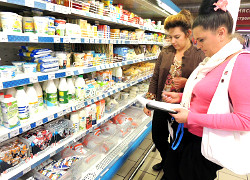Ministry of Trade sets prices free: all prices to grow
49- 16.03.2015, 13:37
- 134,718

The authorities are going to stop controlling prices in Belarus.
The statement was made by deputy minister of trade Iryna Narkevich during a Q&A session on the Belarusian Television and Radio Company.
“We plan a gradual liberalisation. We are going to set prices free soon,” the official said. “According to our pricing laws, prices are formed freely, but they must be reasonable. Prices should be based on reasonable expenses. We will control only prices of socially important products, works and services on the list made by the Council of Ministers.”
The deputy minister said the topic was widely discussed since the beginning of December, “when a gradual transition was organised: a moratorium on prices was later followed by a permission to raise them by a certain percent.”
As for prices in Belarus and other members of the Eurasian Economic Union, the deputy minister noted that equal prices would be the best variant, but it is not easy to achieve it.
“The countries have different local, climatic and other conditions, different supply routes and different currencies […] There are many objective reasons, including production, prime costs of products and various duties. Many factors influence the process. Of course, we have different prices. Some goods can be cheaper in Russia, but the basic group of goods was cheaper in Belarus, when we carried out monitoring. It especially concerns food,” Iryna Narkevich said. “Prices in regions, for example in Ryazan or Smolensk Oblasts, differ from those in Moscow.”
The disadvantage of different prices for the same goods is flow of goods.
“Flows of people in near-border districts are eternal processes. We've already experienced it when prices were lower in Belarus. We should try to make prices equal, but we should not forget that prices are very important for consumers in Belarus, which is a welfare state,” the deputy minister stressed.
The Ministry of Trade forbade to raise prices for an indefinite period after the devaluation of the national currency on December 19 last year. The authorities later set recommendations for pricing. In particular, selling prices can be increased by the manufacturer by the change in costs of raw materials imported from third countries (outside the Eurasian Economic Union) after December 18, 2014, taking into account the share of such costs in the selling price. Raising prices for domestic raw materials and raw materials from the Eurasian Economic Union was forbidden.









